
view out my window, of Lafarge Lake with holiday lights all around it, photo taken the other day
I’m like a wolf, brought up in the city, out of its element
And now uncomfortable, anxious, wherever I go.
I hide in the shadows in places I will not be noticed.
In this odd, ill-fitting, anonymous clothing
I pace the streets, at night, and, just as warily, during the day
Never having learned the art of survival, anyplace
I am a stranger here, and everywhere
For how much longer?
COLLAPSE WATCH
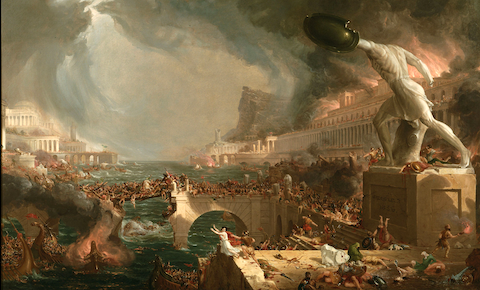
Thomas Cole’s ‘Destruction’, the fourth of his five-panel series ‘The Course of Empire‘, 1836 (referred to in the essay by Ed Simon, linked below). Public domain.
Letter from the collapse: Ed Simon writes a moving, mourning elegy for our collapsing civilization and its victims. It concludes as follows:
I’m only a writer, and the most recondite type, an essayist. Could there by any role for something so insular at the end of the world? In The Guardian, novelist Ben Okri recommends “creative existentialism,” which he claims is the “creativity at the end of time.” He argues that every line we enjamb, every phrase we turn, every narrative we further “should be directed to the immediate end of drawing attention to the dire position we are in as a species.”
I understand climate change as doing something similar to what Dr. Johnson said the hangman’s noose did for focusing the mind. It’s not words that I’m worried about wasting, but experiences. What’s needed is an aesthetic imperative that we somehow live in each moment as if it’s eternal and also as if it’s our last. Our ethical imperative is similar: to do everything as if it might save the world, even if it’s unlikely that it will. Tending one’s own garden need not be selfish, though if everyone does so, well, that’s something then, right?
I’m counting the liturgy of small blessings, noting the cold breeze on a December morning, the crunch of brown and red and orange leaves under foot, the sound of rain hitting my office window, the laughter of my son and the chirping of those birds at the feeder who delight him. I’ve no strategy save for love.
“The world begins at a kitchen table,” writes Poet Laureate Joy Harjo, in a lyric that was introduced to me by a Nick Ripatrazone essay. “No matter what, we must eat to live.” Harjo enumerates all of the quiet domestic beauties of life, how the “gifts of earth are brought and prepared” here, and “children are given instructions on what it means to be human” while sitting at this table, where “we sing with joy, with sorrow. We pray of suffering and/remorse. We give thanks./Perhaps the world will end at the kitchen table, while we are laughing and/crying, eating of the last sweet bite.”
That, finally, is the only ethic I know of as the oceans flood and the fires burn, to be aware of our existence at the kitchen table. When the cicadas come back in 17 years, I wonder what the world will be like for them? I hope that there will be bird song.
The end of growth, deferred but still on track: Richard Heinberg’s latest ‘Museletter’ reviews our ‘progress’ over the past decade at ruining the planet’s capacity to sustain life.
LIVING BETTER
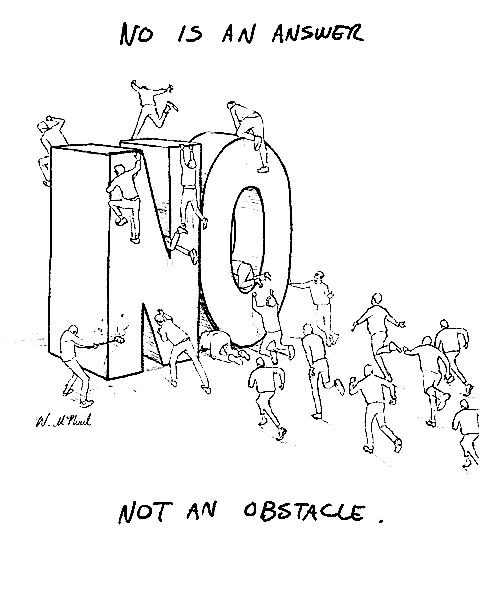
cartoon by Will McPhail from his website
Will South Korea be first to introduce UBI?: The current leader in the March 2022 race for president, Lee Jae-myung, is proposing to introduce a UBI, a land tax to reduce inequality and homelessness, and a substantial carbon tax to address the climate crisis. Politics in that country are notoriously volatile, though, and Lee has only a narrow lead over a Trump-style extreme right-winger.
Cuba shows the way on the climate crisis: Cuba, which has learned resilience in the face of decades-long, cruel embargoes from US ideologue governments, survived the collapse of the Soviet Union, which had helped them deal with the embargoes, by revolutionizing its agricultural practices, and now looks likely to handle climate collapse better than any other country. Its Tarea Vida program is decades ahead of other nations, writes Dr Helen Yaffe, who has made a documentary about the program. Thanks to John Whiting for the links.
Building peace through laughter: Israeli comedian Noam Shuster shows how comedy, and the disruptions of CoVid-19, have helped build bridges between some Palestinians and Israelis. Thanks to Raffi for the link.
Cascadia’s indigenous forest gardens: New ecological studies of the north Pacific coast reveal that forest gardens were planted and maintained there that are as elaborate and advanced as those previously found in Central America. Thanks to Kavana Bressen for the link.
POLITICS AND ECONOMICS AS USUAL
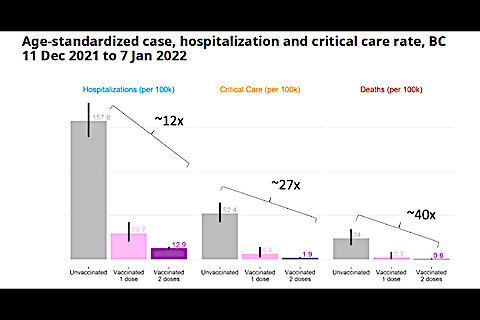
BC CDC CoVid-19 data for the last two weeks, by vaccination status; data for other jurisdictions tells the same story, even in the US, though its reporting in some US areas is now seriously lagging
Is the ‘Great Resignation’ a thing?: Derek Thompson in the Atlantic thinks it is here to stay, and so do Dorothy Wickenden and Cal Newport in The New Yorker. But they seem to see it only as a CoVid-19 phenomenon and a back-to-balance power shift. Could it be a symptom of a larger ‘walking away’ from capitalism, and from the broken, foundering civilization that now depends on it?
Why the supply chain ‘problems’ aren’t going away soon: A truck driver explains who benefits, how we all lose, and the perils we face, if we don’t address the crisis that has paralyzed our seaports and transit terminals. Thanks to Paul Heft for the link.
The New Misogyny: Christine Rosen describes how some of the supposedly ‘progressive’ demands of trans extremists are hostile to all women and could, unless arrested, lead to a form of “female cultural erasure”, setting back many of the women’s movement’s most important accomplishments. It is truly sad that it’s right-wing journals, not progressive ones, reporting on this important subject, and sometimes using it as a ‘wedge’ issue. Progressives, wake up, you’re being played!
Corpocracy, Imperialism & Fascism: Short takes:
-
- In a breaking of ranks of sorts, NYT reporter Dave Philipps tells NPR that ‘rogue’ American forces knowingly and recklessly killed thousands of Syrian civilians by bypassing approval procedures for drone strikes. Chilling revelations.
- I’m reasonably convinced that 5G doesn’t pose a hazard to human health. I’m less convinced that it doesn’t pose a hazard to commercial airplane navigation. Thanks to Paul Heft for the link.
Inequality: Short takes:
-
- Indi Samarajiva explains how easy, and sad, it is to pamper our children when we live in situations of privilege, forgetting how so many children have to do without. A powerful bit of writing.
CoVid-19 Becomes the Pandemic (mostly) of the Unvaccinated: Short takes:
-
- The US CDC really has become a “dumpster fire”, according to the Atlantic’s Katherine Wu — incompetent, inconsistent, unclear and self-defeating guidelines, and lousy communications that jeopardize the health of US citizens. Her colleague Ed Yong summarizes the blunders and lays the responsibility on the erratic and often incoherent director, Rochelle Walensky. And Zeynep Tüfekçi weighs in on the director’s latest missteps. This is what happens when public health agencies are starved, for years, of adequate resources and professional (especially communications) staff.
- Testing is easy to get in a few places, and still difficult-to-impossible in most places, due to chronic government screw-ups just about everywhere. Good-quality masks are also still very hard to come by in many areas, for the same reason.
- So here it is again, short and simple: First, look at the chart above.
- Get vaccinated and boosted.
- If you are lucky enough to have access to adequate, affordable testing in your neighbourhood, get tested before and after any risky (ie crowded, maskless, extended close-proximity, and/or indoor) activities.
- Wear a properly fitting N95 or similar medical-quality mask, or double-mask if N95’s don’t work for you or aren’t available near you, whenever you’re indoors with other than immediate family for any significant period of time. Here are the best-rated reusable masks, one of which will certainly work for you, if it’s available.
- Here’s what to do if you get omicron, and what not to do/take. Obviously, isolate for at least 5 days (10 if you can), and wear a mask and wash your hands regularly for 10-14 days, but if your symptoms aren’t mild, then short of hospitalization there are now some additional options, along with all the quack cures, explained in the above link.
- Omicron is considerably less serious than previous variants, but that doesn’t mean it’s not very dangerous, especially if you (or those you’re in close contact with) haven’t been double vaxxed and boosted. And then there’s the risk of Long CoVid to consider, even if you’re asymptomatic. (Thanks to Kavana Bressen for most of the links above.)
- Omicron case rates are peaking in many areas, and hospital rate increases are slowing. A month from now we should again be on the downside of the curve in most places, barring additional variants.
- Socially distancing, while less critical than vaccination, masks, and frequent testing-and-isolating, is still useful, especially when you’re near people who are or may be infected. Proximity matters. It’s not unreasonable to assume that in areas with high case rates, as many as one of every 20 strangers you encounter could be infected. If they’re unmasked, or poorly masked, or talking loudly, keep your distance. Thanks to John Whiting for the link.
- A legal, inexpensive, and easy-to-produce acid from hemp plants has shown great promise in preventing coronavirus infections. Stay tuned.
FUN AND INSPIRATION
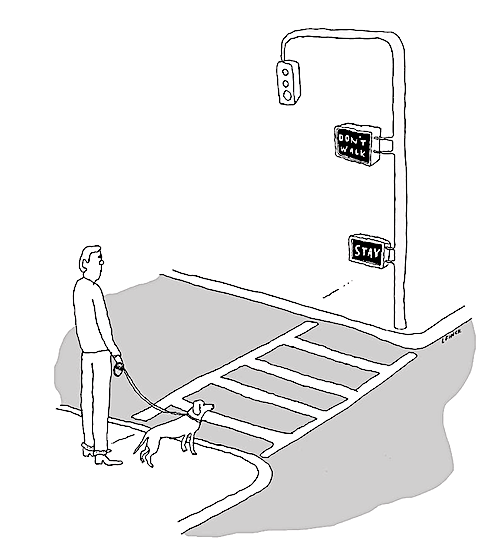
New Yorker cartoon by Liana Finck — she has a new book coming out too!
It wasn’t my character’s fault: Have writers and filmmakers overused the hero-or-villain-as-victim-of-childhood-trauma plot?
All depends how you ask the question: In a recent survey, where the questions were asked in a rather deceptive manner, a majority of Republicans opposed teaching of Arabic numerals in schools, and a majority of Democrats opposed the teaching of the Big Bang theory of the universe’s creation. Thanks to John Whiting for the link.
On the edge of non-duality: I’m fascinated to read Caitlin Johnstone’s occasional forays into non-duality, squeezed between her articulate tirades against corporatism and imperialism. Now, another of my favourite political essayists, Indi Samarajiva has written a post on non-duality. I’d love to meet them and explore how they deal with the cognitive dissonance: Clearly, to me at least, if there is no self, there can be no free will, and if that’s so, how can we blame anyone, no matter how iniquitous their actions?
How writing is like cricket: In another fascinating article by Indi, he shows how the sport of street cricket is an essential part of the culture of his native Sri Lanka.
Our calendar makes no sense: Hank Green hilariously proposes a more sensible one.
The ‘superior mirage’ phenomenon: In which an iceberg is seen floating off the coast of BC. The mountains in question can be seen from my window, and, despite the recent ‘atmospheric river’ here, show no signs of becoming maritime anytime soon.
Fat-phobia consequence, eight letters: New Yorker puzzler Anna Shechtman explains how crossword puzzles became part of her coming-of-age story.
The tree of life: OneZoom shows the entire tree of known life on earth, on one highly zoomable chart. Humans, delightfully, are an insignificant part of the tree, a twig on one ordinary branch. Thanks to Ben Collver for the link.
Science goes to the dogs: A Canadian science reporter engages a much larger audience by including his dogs, and his scientist guest’s dogs, in his ‘pawdcast’. You can hear all the episodes here, featuring Bunsen the Berner.
THOUGHTS OF THE MONTH
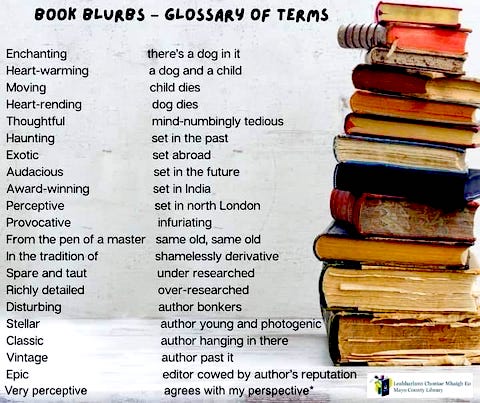
from the Memebrary; *last line added by Kavana’s friend Karon’s sister
From Anahid Nersessian, in NYRB:
It’s all very well to say “capitalism turns us into commodities, that’s degrading, human beings shouldn’t be degraded.” But how should we be treated, and how should we live? What would love and sex—among other things, like health care or having a job—look like in a good world? It’s important to take the risk of answering those questions, even if the answers are messy and provisional.
From The Beaverton: “Artist, paid in, dies of, exposure.”
From Michael Parenti, via Caitlin Johnstone, on public opinion:
“But they [military industrial complex] don’t care about what we think. They turn a deaf ear to us,” some people complain. That is not true. They care very much about what you think. In fact, that is the only thing about you that holds their attention and concern. They don’t care if you go hungry, unemployed, sick, or homeless. But they do care when you are beginning to entertain resistant democratic thoughts. They get nervous when you discard your liberal complaints and adopt a radical analysis. They do care that you are catching on as to what the motives and functions of the national security state and the US global empire are all about at home and in so many corners of the world. They get furiously concerned when you and millions like you are rejecting the pap that is served up by corporate media and establishment leaders.
By controlling our perceptions, they control our society; they control public opinion and public discourse. And they limit the range and impact of our political consciousness. The plutocrats know that their power comes from their ability to control our empowering responses. They know they can live at the apex of the social pyramid only as long as they can keep us in line at the pyramid’s base. Who pays for all their wars? We do. Who fights these wars? We do or our low-income loved ones do. If we refuse to be led around on a super-patriotic, fear-ridden leash and if we come to our own decisions and act upon them more and more as our ranks grow, then the ruling profiteers’ power shrinks and can even unwind and crash—as has happened with dynasties and monarchies of previous epochs.
We need to strive in every way possible for the revolutionary unraveling, a revolution of organized consciousness striking at the empire’s heart with full force when democracy is in the streets and mobilized for the kind of irresistible upsurge that seems to come from nowhere yet is sometimes able to carry everything before it.
There is nothing sacred about the existing system. All economic and political institutions are contrivances that should serve the interests of the people. When they fail to do so, they should be replaced by something more responsive, more just, and more democratic.
From WH Auden:
The Fall of Rome
(for Cyril Connolly)
The piers are pummelled by the waves;
In a lonely field the rain
Lashes an abandoned train;
Outlaws fill the mountain caves.
Fantastic grow the evening gowns;
Agents of the Fisc pursue
Absconding tax-defaulters through
The sewers of provincial towns.
Private rites of magic send
The temple prostitutes to sleep;
All the literati keep
An imaginary friend.
Cerebrotonic Cato may
Extol the Ancient Disciplines,
But the muscle-bound Marines
Mutiny for food and pay.
Caesar’s double-bed is warm
As an unimportant clerk
Writes I DO NOT LIKE MY WORK
On a pink official form.
Unendowed with wealth or pity,
Little birds with scarlet legs,
Sitting on their speckled eggs,
Eye each flu-infected city.
Altogether elsewhere, vast
Herds of reindeer move across
Miles and miles of golden moss,
Silently and very fast.





Hi Dave. I’m 3/4th the way through reading this recent & lengthy Paul King’snorth essay & would like to hear you & your readers weigh in. You went to the UK a few years ago and met King’snorth if I remembering correctly? You’ve also mentioned him numerous times.
I’ve read some of his stuff before. He’s a skilled writer & I agree with much of his thesis – that Covid is being used as a techno power grab, but some of his Covid ‘experts’ I don’t buy.
The Vaccine Moment
Covid, Control & The Machine
https://static1.squarespace.com/static/5e1389371effc55c2dc0f659/t/61ddc218fce12b65ced96c72/1641923097415/VACCINE+MOMENT.pdf
I always love your “links of the..” posts. Thank you.
Hi DrS — I dealt with the CoVid-19 essay by Paul in this article — https://howtosavetheworld.ca/2021/12/11/progressives-vaccine-mandate-meltdown/
I enjoyed meeting and learning from Paul, especially our “harvest” at the Dark Mountain event, and I still think his and Dougald’s Manifesto is a masterpiece. But he’s out of his depth on the science of vaccines and viruses and what is needed to defeat pandemics.